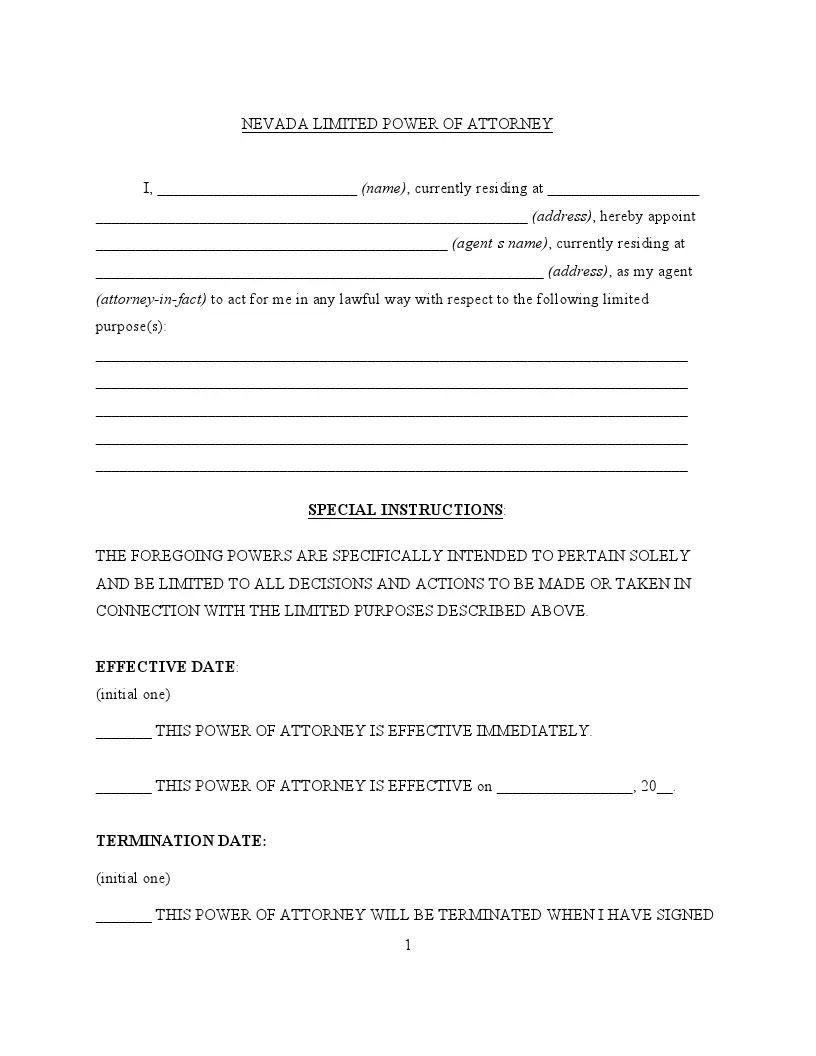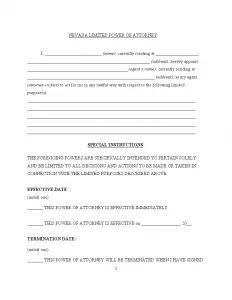Nevada Limited Power of Attorney Form
A Nevada limited power of attorney is a legal document that grants one person (the “agent”) the authority to act on behalf of another person (the “principal”) in specific matters or transactions. This form is tailored to specific tasks, such as handling certain financial dealings, managing real estate transactions, or making decisions solely during a predetermined period or under certain conditions.
The limited power of attorney ensures that the principal maintains greater control over the extent of authority given to the agent. It’s commonly used when the principal cannot manage these affairs due to absence or incapacity. This document must be completed in compliance with Nevada state laws to ensure its validity and enforceability.
Completing and signing the appropriate Nevada power of attorney forms is important to ensure that your financial and health care decisions are made according to your wishes.

Build Your Document
Answer a few simple questions to make your document in minutes
Save and Print
Save progress and finish on any device, download and print anytime
Sign and Use
Your valid, lawyer-approved document is ready
In Nevada, the signing requirements and legal frameworks governing limited powers of attorney are outlined under the Nevada Revised Statutes, Sections 162A.010 – 162A.660. According to Section 162A.220, for a limited power of attorney to be legally binding, it must be duly notarized by a notary public. It ensures the document’s authenticity and the principal’s intent.
Specifically, Section 162A.450 clarifies the authority granted through a limited power of attorney. An agent can perform the following actions only if expressly allowed by the power of attorney and if other agreements do not prohibit such actions:
- Create, modify, cancel, or end an inter vivos trust.
- Make a gift.
- Establish or modify rights of survivorship.
- Set or change a beneficiary designation.
- Pass on powers given by the power of attorney.
- Give up the right to benefits from a joint and survivor annuity.
- Use fiduciary powers that the principal can delegate.
- Refuse property, including decision-making powers.
However, unless specified differently within the power of attorney, an agent who is not the principal’s spouse cannot use this power to create personal benefits from the principal’s property. This statute ensures that the principal’s assets are managed strictly according to their expressed wishes, safeguarding against potential abuses of power.
Nevada Limited Power of Attorney Form Details
| Document Name | Nevada Limited Power of Attorney Form |
| Other Name | Nevada Special Power of Attorney |
| Relevant Laws | Nevada Revised Statutes, Section 162A.450 |
| Avg. Time to Fill Out | 8 minutes |
| # of Fillable Fields | 32 |
| Available Formats | Adobe PDF |
Filling Out Nevada Limited POA
Completing a Nevada limited power of attorney requires precision and attention to detail to ensure the form is legally valid and accurately reflects your intentions. Below is a step-by-step guide to help you fill out this form effectively.
1. Obtain the Form
Start by obtaining the most recent version of the limited power of attorney form specific to Nebraska. You can usually find this template online on FormsPal.
2. Choose Your Agent
Select a trusted individual to act as your agent (also known as an attorney-in-fact). This person will have the authority to perform tasks on your behalf as specified in the form. Consider choosing someone reliable, trustworthy, and capable of handling the responsibilities you assign to them.
3. Specify Powers
Clearly outline the specific powers you are granting to your agent. This might involve managing financial transactions, making healthcare decisions, or handling real estate matters. Be as detailed as possible to avoid ambiguity regarding your agent’s authority.
4. Include Any Restrictions
If you wish to limit the powers granted, specify these restrictions in the form. It could be limiting the duration of the power of attorney or restricting the scope of decisions the agent can make.
5. Fill Out the Form
Complete the form by entering all required information, including your full name, the full name of your agent, and the specific powers granted. Ensure all information is accurate and spelled correctly to avoid issues with legality or execution.
6. Sign and Notarize
Once the form is filled out, review it with your agent to ensure all details are correct and understood. Then, sign the form in the presence of a notary public. Nebraska requires that limited power of attorney forms be notarized to be legally effective.
Review the document frequently to ensure it meets your needs and situation. If your circumstances change, such as a shift in your relationship with your agent or your legal requirements, be sure to update the form accordingly.
